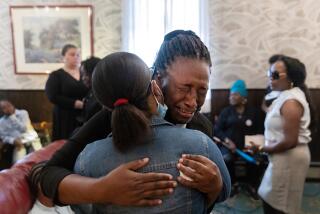Court to hear terror suspect appeal
The Supreme Court announced Friday that it will take up a controversial Bush administration legal policy and decide whether the president has the power to order the military to arrest and hold a civilian in the United States on the basis of suspected ties to terrorists.
The justices voted to hear the case of Ali Saleh Kahlah al-Marri, the only person who remains in military custody in this country as an “enemy combatant.” Administration officials say he came to the United States on a “martyr mission” for Al Qaeda.
The court will hear arguments in March, two months after the Bush administration has left office. The case presents an interesting test for the incoming Barack Obama administration, which could defend the government’s handling of Marri’s case or change course and prosecute him in criminal court.
“The Supreme Court’s decision to grant review will compel the incoming Obama administration to quickly focus on U.S. detention policy,” said Sharon Bradford Franklin, a lawyer for the Constitution Project. “We hope that President-elect Obama will resoundingly reject the current administration’s breathtaking claim that the United States may hold a civilian in military detention indefinitely.”
Marri, a native of Qatar, entered the United States with his family on Sept. 10, 2001, and said he was seeking a master’s degree at Bradley University in Peoria, Ill. He had earned a bachelor’s degree there a decade earlier. Three months later, the FBI arrested him and said agents found on his laptop computer information about cyanide and other poisonous chemicals. Officials said they also learned that he had received payments from Al Qaeda financiers.
At first, the government intended to try Marri on charges of credit card fraud. But in June 2003, President Bush signed an order designating Marri as an “enemy combatant,” and he was taken to a military brig in South Carolina. He has been held there in virtual isolation for more than five years.
The Supreme Court will not decide whether Marri is an agent of Al Qaeda. Instead, the justices will decide whether the Bush administration had the legal authority to bypass the nation’s civilian laws and to hold a civilian in military custody.
The 5th Amendment says “no person shall be deprived of life, liberty or property without due process of law,” and that constitutional protection has been interpreted to apply to all persons in this country, not just citizens.
In their appeal on Marri’s behalf, lawyers for the American Civil Liberties Union said his case raises “a question of exceptional national importance.” Since the nation’s founding, they said, the Constitution’s due process provision has been understood to mean “people arrested in this country have the right to a speedy criminal prosecution.”
Reacting to the court’s announcement, ACLU Legal Director Steven R. Shapiro said he was hopeful the justices would “ensure that people in this country cannot be seized from their homes and imprisoned indefinitely simply because the president says so.”
The Marri case is separate from the litigation over detainees at the U.S. naval base at Guantanamo Bay, Cuba. Those prisoners were captured abroad and have not officially entered the United States.
Earlier, Jose Padilla, a native New Yorker, had been held in military custody in the U.S. as an enemy combatant. He had been arrested at O’Hare Airport in Chicago in 2002, on his return from Pakistan. The Supreme Court did not rule on his case, however. One of his appeals was on its way to the court when the administration switched course and brought criminal terrorism charges against Padilla in Florida. He was convicted and imprisoned.
Bush administration lawyers had urged the court not to hear Marri’s appeal. They said his “military detention is lawful given [his] close association with Al Qaeda and entry into this country for the purpose of committing hostile and war-like acts.”
They argued that the president was given the power to hold “enemy combatants” when Congress adopted the Authorization for the Use of Military Force:S.J.RES.23.ENR: a week after the 9/11 attacks. It says the president may use “all necessary and appropriate force against those nations, organizations, or persons he determines planned, authorized, committed, or aided the terrorist attacks that occurred on September 11, 2001.”
Some Democrats in Congress have said that the resolution gave the president the power to use military force abroad but did not change the law in the United States.
In July, the U.S. Court of Appeals in Virginia issued a fractured ruling in Marri’s case. The court ruled 5-4 that the president could indefinitely hold an alleged terrorist in military custody. By the same margin, the court also said Marri deserved a hearing before a judge to review the evidence against him.
Pepperdine Law Professor Douglas Kmiec said the Supreme Court’s vote to hear the case “is quite a surprise.” He said the justices could have allowed the hearing to continue, while the Obama administration formulates a new policy on how to handle such cases.
--
More to Read
Get the L.A. Times Politics newsletter
Deeply reported insights into legislation, politics and policy from Sacramento, Washington and beyond. In your inbox three times per week.
You may occasionally receive promotional content from the Los Angeles Times.







